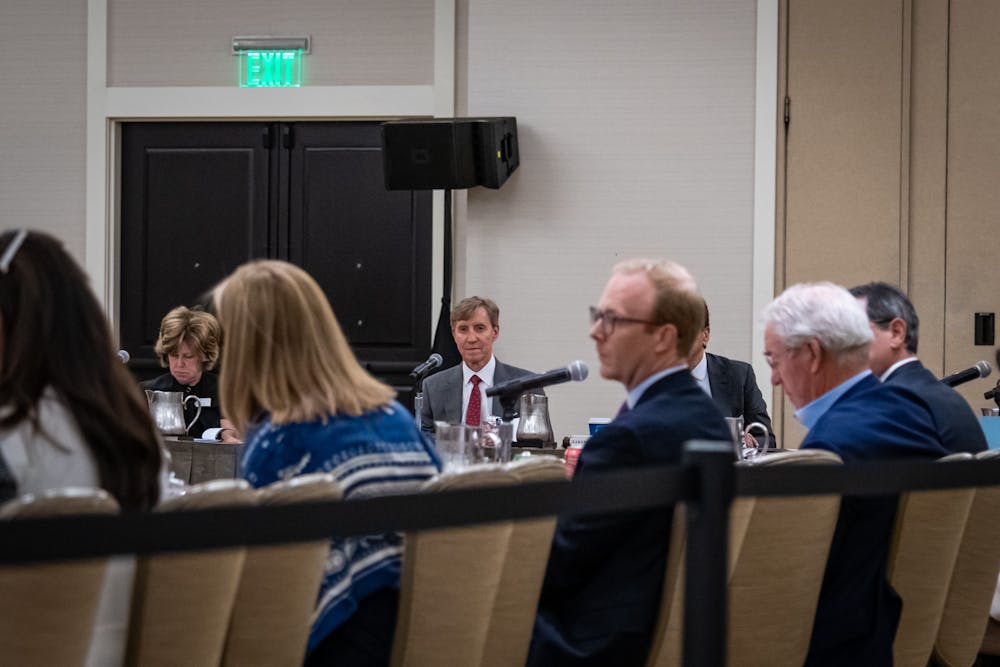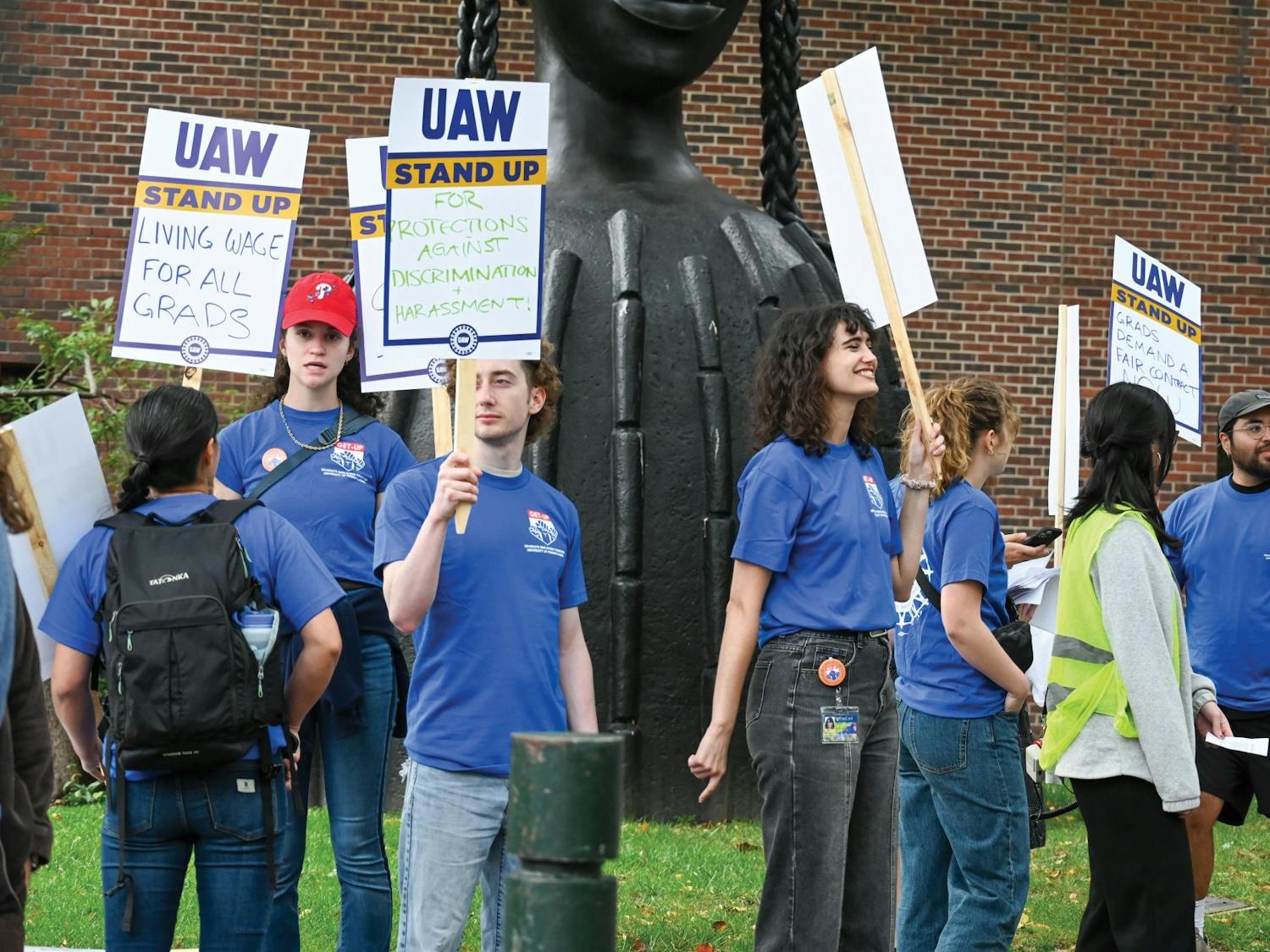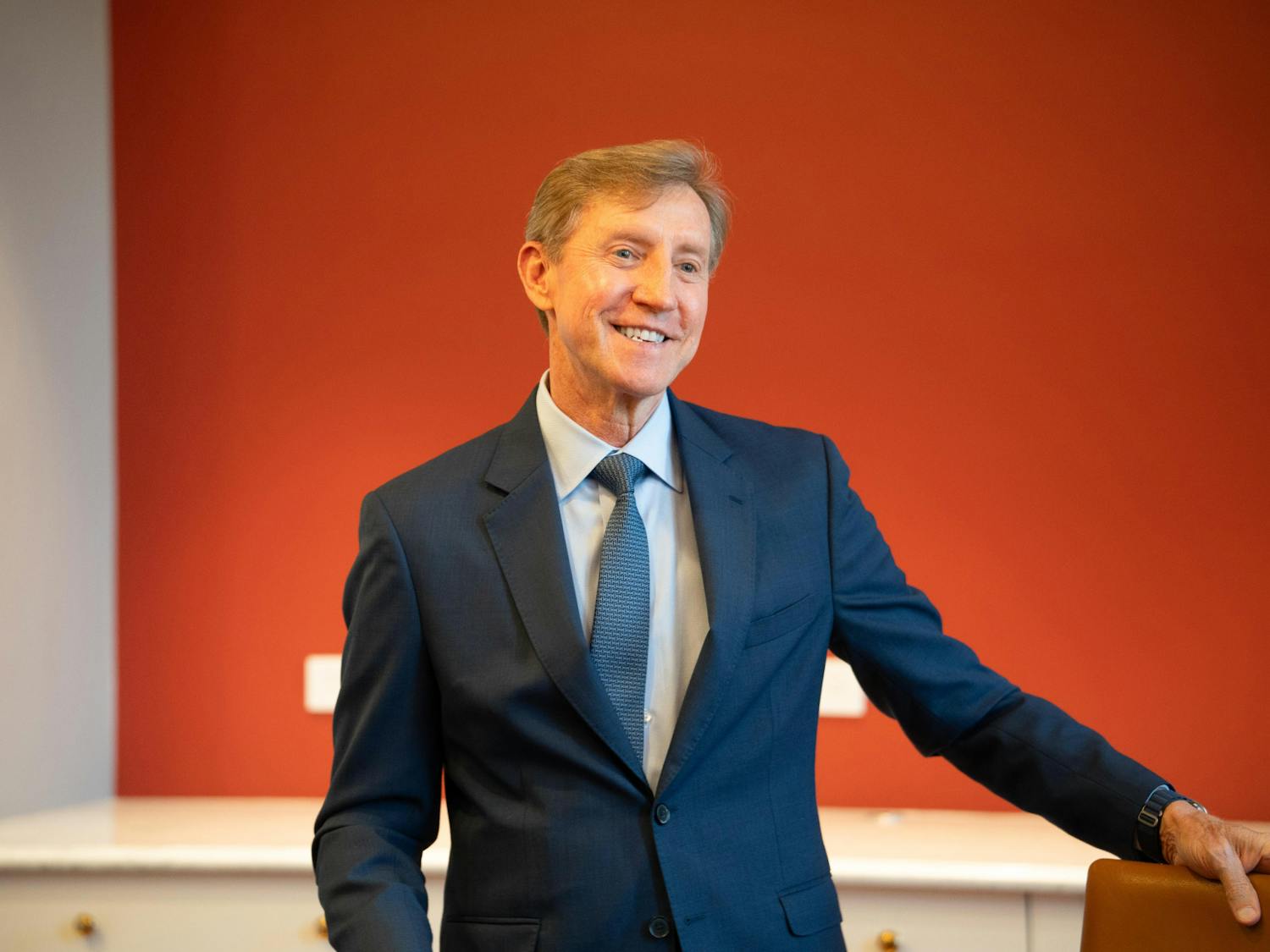The University's Board of Trustees gathered at the Inn at Penn for its annual Spring Full Board Meeting last week.
The board, which carries the University's “formal institutional governance and fiduciary responsibility,” met on June 12 and 13 to hear briefings and reports from senior Penn administrators on topics ranging from campus renovations to budgetary plans. Forty-three resolutions were passed across eight trustees committees, five of which opened their meetings to the public.
The heightened scrutiny that Penn and universities across the country have experienced over the past six months echoed throughout the Trustees’ discussions, with board members and administrators often acknowledging the “uncertainty” of the political landscape in the fiscal year ahead.
In his opening remarks, Penn President Larry Jameson reiterated the University’s commitment to “excellence” in academics and research, despite “significant headwinds” — including funding threats to research and the status of international students.
“We will continue with everything in our power to protect Penn’s missions, academic freedom, and people. We will also adapt, evolve, and move Penn forward,” Jameson said. “The world will continue to benefit from Penn’s exceptional graduates, knowledge creation, care, and service.”
Here are six key takeaways from the meeting:
1. Federal pressures and Penn’s advocacy efforts in Washington
Vice President of Government Affairs Jeffrey Cooper reported on the “constant challenges” Penn faces from the federal government at the Local, National, and Global Engagement Committee meeting on Thursday.
RELATED:
Penn Board of Trustees votes to raise debt authorization as ‘insurance’ amid financial pressures
Cooper — whose plans to retire from his post were announced during the meeting — addressed the proposed endowment tax being discussed during reconciliation bill negotiations. While universities — including Penn — currently pay a 1.4% tax on endowment investment gains, the Republican-proposed tiered system would impose rates as high as 21%.
“[Penn is] in that equation right on the cusp between 7% and 14%, depending on how we count,” Cooper said.
Penn is among a group of around two dozen elite universities that have formed an organization called the Learn Alliance, according to Cooper. The institutions are hoping to reach a compromise with the federal government in which they would agree to spend at least 5% of their endowments annually — primarily on student aid and research — in exchange for a lower tax rate of 2.4% or 3.4%.
At the federal level, Penn is working with national organizations to “advance the common interests of higher education," Cooper said, emphasizing that the partnerships have made “advocacy more effective in a collective way.”
Cooper’s report also addressed “dramatic” changes to the federal research funding process, including a requirement that grant recipients do not have “DEI programs” inconsistent with the administration's interpretation of Title IX, gender identity, and “diverse populations.”
“In order to even get money, we have to make sure that our programs don't conflict with the federal government's view on those issues," Cooper stated. "It’s not easy to do, but our goal is to keep the university functioning at the highest and best level possible."
The Department of Education has levied demands against Penn for its violation of Title IX and a probe into the University’s foreign funding disclosures. Penn is also part of a congressional investigation into the Ivy League regarding antitrust violations.
“The amount of effort that goes into responding to these investigations and the request for documents is enormous,” Cooper said. "It is just really overwhelming. We have tried to be as responsive as possible in the hopes that that will help build a more positive relationship with the administration.”
2. Penn’s engagement with local and state politicians
University leaders are engaged in advocacy at the state and local levels amid escalating political, financial, and operational pressures, according to Cooper. He noted during Thursday’s meeting that Jameson has met with “many” politicians, including Sens. John Fetterman (D-Pa.) and Dave McCormick (R-Pa.).
Cooper affirmed Penn’s “growing and deepening relationship” with Gov. Josh Shapiro’s administration — including a “productive” meeting between Jameson and Shapiro the week prior.
A significant portion of Cooper’s report focused on Penn’s relationship with the City of Philadelphia and its elected officials. He remarked that political challenges have "brought together a very strong community of advocates in Philadelphia."
Cooper noted that Penn is lobbying the state and city on behalf of SEPTA — which is currently facing a critical budget cut — alongside hundreds of other local stakeholders, adding that transit funding is a “directly dependent appropriation” for the University.
Cooper also acknowledged a “rather contentious meeting” between Jameson and progressive members of the State House and City Council. The Daily Pennsylvanian previously reported that multiple elected officials expressed concern at the Feb. 25 discussion about Penn’s rollback of diversity, equity, and inclusion policies — with one local lawmaker calling the meeting “bullshit.”
On May 9, elected officials held a hearing on the same topic, for which Cooper submitted written testimony on behalf of the University. During the event, officials condemned Jameson’s “refusal” to attend the hearing.
“Progressive members are less than satisfied with how we approach [DEI] and have clearly voiced their opposition, but we have been working hard to help them understand the constraints that we are under, and again, our goals of keeping the University functioning and keeping as many people here and employed as possible,” Cooper said.
3. Financial strategy amid “uncertainties forecast for the new year”
At Thursday’s Budget & Finance Committee meeting, Vice President for Finance and Treasurer Mark Dingfield reported that Penn is expecting a $1.7 billion increase in net assets, bringing the total to $32.6 billion for fiscal year 2025, driven by the University of Pennsylvania Health System’s rebound in operating margins and a one-time legal settlement “related to COVID vaccine revenues.”
Despite the positive financial report from the closing fiscal year, Dingfield outlined a more "cautious" budget plan for the upcoming year citing a "rather significant external financial uncertainty."
Dingfield said that two major campus construction projects — the David Rittenhouse Laboratory Physical Sciences Building and the Wharton Learning Center — will drive a significant portion of Penn’s projected long-term spending. The two initiatives, along with several smaller future projects, total $1.2 billion in capital expenditures and will help provide Penn with fiscal flexibility over the next five years, according to Dingfield.
“Depending upon our financial conditions, we'll have some ability to decide whether or not we will proceed with them,” Dingfield said.
Penn follows a policy to “maintain at least 75 days of cash on hand,” but currently holds about 194 days' worth of funds, according to Dingfield. However, the University is strategically moving some short-term cash into its endowment, which earns more but is less liquid. In the case of “any significant exogenous shocks," he said, Penn can shift cash back from the endowment to cover immediate needs.
Additionally, Dingfield shared that the $500 million in new lines of credit approved by the board in May have “all now been executed.”
Vice President for Budget Planning and Analysis Trevor Lewis reported in his academic operating budget presentation that proactive hiring freezes and discretionary spending cuts announced in early March have since taken effect. Lewis also noted that the University’s decision to significantly reduce graduate program admissions has “worked” to control costs.
Lewis highlighted Penn's capability to handle short-term revenue losses due to its "strong balance sheet" and "proactive measures to cut costs," but said that "if reductions in revenues turn out to be more significant and prolonged, we have to adopt sustainable cost-saving measures quickly.”
4. Immigration uncertainty and Penn’s academic planning
In his presentation to the Local, National, and Global Engagement Committee, Cooper addressed “significant issues” surrounding international students and federal immigration policies. He cited the government's pause on scheduling visa interviews, adding that “it's unclear who, or how many, or which students will be arriving in August.”
“There are just ongoing, constant issues with very little clarity in Washington as to where to go, who to talk to, and how to resolve the issues,” Cooper said.
The federal government recently announced a travel ban on 12 countries, which Cooper reported would affect around 200 Penn students from the listed countries.
“I wish I could tell you what the result is going to be on that, but I just don't know,” he added.
Deputy Provost Beth Winkelstein — who recently announced that she will be departing Penn to serve as Northeastern University’s provost — said that the Graduate School of Education has launched online programs for international students who are unable to return to the United States.
“Depending on where the student comes from, depending on where they are currently, depending on their program, we are exploring — and I don't mean just starting to explore, we are really in the nuts and bolts — everything from a late arrival to a deferral,” Winkelstein said. “The schools want to welcome them whenever they can get here.”
5. Five new master's programs
During his presentation to the Budget and Finance Committee meeting, Lewis outlined a number of “proactive financial measures” being taken at the school and center levels, including the introduction of new degree programs to expand academic offerings.
At the Academic Policy Committee meeting later on Thursday, trustees passed resolutions approving the creation of five new graduate programs.
Annenberg School for Communication Dean Sarah Banet-Weiser presented a one-year master’s program in Communication and Media Industries, marking the first non-doctoral degree offered by the school. Banet-Weiser said the school aims to enroll a cohort of 15 students in its inaugural semester in fall 2026.
Professors Ram Cnaan and Chao Guo from the School of Social Policy and Practice proposed a Doctorate in Nonprofit Administration program to train “interdisciplinary” industry leaders with the specific needs of mission-driven nonprofit and philanthropic organizations.
Wharton School Senior Vice Dean for Teaching and Learning and Accounting professor Brian Bushee introduced a “4+1” Master of Science in Quantitative Finance program that enables undergraduate students to earn a postgraduate degree by completing coursework during their senior year and one additional year at Wharton. The program will aim to prepare students for careers in quantitative finance, including data analysis and coding.
The Perelman School of Medicine proposed two new master’s degrees, splitting the existing Master of Biomedical Informatics into two programs: one for practice-based training and one for research-based training. The Clinical Informatics program aims to train clinical practitioners in health care engineering, while the Biomedical Informatics program aims to train scientists and researchers for academic and research roles.
6. Ramanan Raghavendran re-appointed as Chair of the Board of Trustees
Through a unanimous motion by the 42 board members present at the Friday meeting, the Trustees reappointed Ramanan Raghavendran as their chair through June 30, 2029. Raghavendran — a 1989 Engineering and Wharton graduate and 2015 College of Liberal and Professional Studies graduate — was appointed to the role in January 2024.
“I appreciate the confidence and the enthusiasm,” Raghavendran said after the resolution’s approval. “I'm grateful for the honor and look forward to continuing my service.”
Board of Trustees Vice Chair Julie Beren Platt was also reelected to serve in her role through December 31, 2025.









